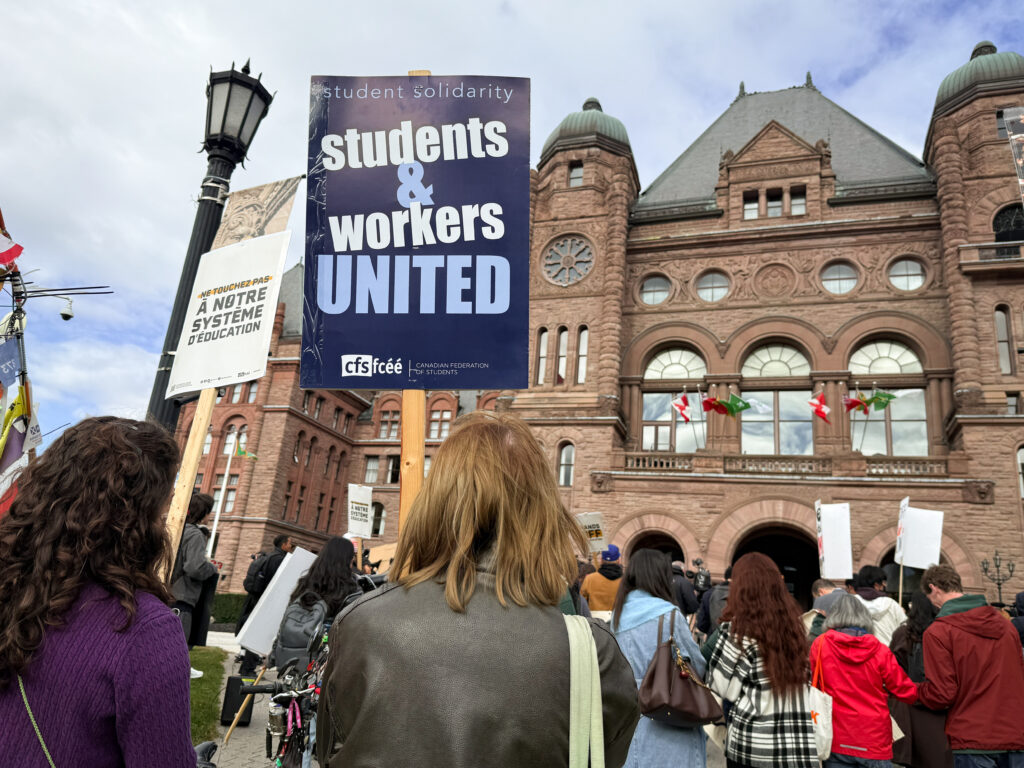
Students gathered at Queen’s Park on Monday to protest the Ford government’s proposed Bill 33, saying the legislation threatens the core of campus life and limits access to education.
The rally marked the start of the Ontario-wide week of action for education, coinciding with MPPs’ return to the legislature. Organized by student unions and advocacy groups, the protest is part of a larger campaign urging the government to withdraw Bill 33.
Formally titled the “Supporting Children and Students Act,” the bill was introduced by the Ford government in May, and a press release states that the bill aims to give students more control over how their fees are spent and promises greater transparency around admission requirements and research security.
The bill introduces measures including the opt-out of certain fees, implementing merit-based admissions, tightening oversight of student organizations and expanding campus surveillance.
“[The Ford government is] trying to take away the autonomy of our institutions to decide who can learn, and really affecting the accessible and equitable education,” said Trudy Kuropatwa Trent, a Toronto Metropolitan University (TMU) student and president of the Performance Student Union.
Section 16.0.2 of Bill 33 outlines a requirement for colleges of applied arts and technology and publicly-assisted universities called “merit-based admission.” Critics argue the term is undefined and risks excluding underrepresented students.
“Education is a human right and Doug Ford’s government and the use of this language reveals that they ultimately view our education as an industry,” Trent said. “It can be exploited at the expense and exclusion of poor students, students of colour, Black and Indigenous students and students from up north.”
The uncertainty around merit-based admissions is particularly troubling, said Rajveer Singh, chair of the provincial advocacy group Ontario Student Voices (OSV).
“There already is a system that exists; you need a minimum requirement to enroll into any program,” Singh said. “What the government is trying to do is make a divide between the students on the basis of merit.”
Student union representatives also say they worry the bill will undermine the funding of services that students rely on. Singh pointed to food banks, transit programs, mental health supports and academic appeals as essential resources at risk if students are allowed to opt out of union fees.
“The services that are already in place by the student associations from different colleges are really essential and impactful, but as they’re in place, people don’t really understand the value of it,” Singh said. “But once they are taken out, then people will start valuing those resources.”
The opt-in and opt-out structure would destabilize student life on campus, said Eloghosa Avenbuan, president of the Ontario Tech Student Union (OTSU),
“If students have the opportunity to opt out of these, especially at the club fees, then we will see a really big decline in societies,” she said. “That makes up a big part of student life, and it also brings a lot of uncertainty with budgets and funding.”
In a statement to On The Record regarding concerns of merit-based admissions and if student-approved fees will be protected, Bianca Giacoboni, press secretary to Minister Nolan Quinn, wrote that Bill 33 is designed to build trust and transparency in Ontario’s post-secondary system.
“When students choose Ontario’s world-class colleges and universities to pursue their postsecondary education, they deserve to know where their fees are going, what criteria they need for admission and how their research will be,” Giacoboni wrote in the statement.
Giacoboni’s statement said that no changes will be finalized until consultations with students and institutions are complete.
Student leaders say they will continue organizing through coalitions, petitions and advocacy campaigns.
“When all of us come together, our voices are united,” Singh said of the Coalition to Protect Student Services, a network of unions and associations across Ontario pushing back against the legislation. “We have much more impact on the government.”
The Canadian Federation of Students submitted a petition titled Hands Off Our Education to parliament last Friday with a total of 12,000 signatures opposing the bill.
The petition reads, “Bill 33 threatens the structure and function of primary and secondary education, impacting all current and future post-secondary students.”
Used Otter.Ai to transcribe interviews.

